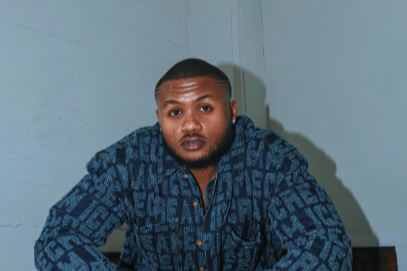The eagerly awaited debut album, The Distance Between Dreams, has been released by Brandes, the musical persona of author and Labour MP Peter Bradley. Like his illustrious background, Brandes’ musical development is profound and intensely personal. Through the perspective of personal history, The Distance Between Dreams provides listeners with a reflection of the human condition that goes beyond its individual tracks. Everyone who hears Brandes’ music will be forever changed by its intensely resonant rawness.
From MP to musician—what’s been the biggest surprise in making that leap?
I wouldn’t say there have been too many surprises – and I’ve covered the distance more in small steps than in one great leap. The person who was an MP is the person who’s also been a writer, a singer, a father, a friend and much else. No-one’s defined solely by what they do at any one time. And no-one should think that what they do today limits what they might do tomorrow.
How did the idea for ‘The Distance Between Dreams’ first come to life?
I rarely have a plan for my creative work and, when I start out, I write solely for myself. My books, essays and journalism all arise because a thought has entered my head and won’t let me alone until I’ve explored and explained it to myself on paper. It’s only when I’m happy with what I’ve written that I think that perhaps others might be interested in it. It’s been the same with my songs. To be honest, The Distance…is an accidental album. It only came about when I bamboozled my guitar teacher, Dale Fewtrell, into helping set my lyrics to music. I was actually trying to distract him from my lack of musicianship! But when we’d finished we thought, maybe someone might want to hear this, perhaps there’s an album here.
Which track on the album changed the most from its original version to the final recording?
That would probably be Please Don’t Call. It started as a narrative about a barroom dancer and the man she strings along. On reflection, I thought that storyline was a bit contrived and didn’t really work. As I rewrote it, it became a little more reflective and intimate in tone, but still has a contrasting chorus which is about as contemporary as I get!
What’s one lyric on the album that you’re particularly proud of—and why?
It would be easier to tell you about the lines I don’t like. I’ll have fretted over them a very long time but could never quite get them right. Which they are, I’ll keep to myself. Perhaps the most significant lyrics are the first I wrote. “There was ice on her eyelids and flakes in her hair” came to me as I was falling asleep one night. I didn’t realise those words would become lyrics but the image they conjured haunted me, demanding a setting and eventually finding it in The Bridge, the first song I wrote. The whole album grew from that fragment.
If you could sit down and play this album for any artist, living or dead, who would it be?
If I had the nerve, it would have to be Leonard Cohen. I’d also love to ask Joni Mitchell if she could spot the song that’s modelled on one of hers. She might struggle!
“Song for Mordecai” is unlike anything else on the album—how did that sonic palette come together?
This is one of my more recent songs. I read George Eliot’s novel Daniel Deronda when I was writing my book, The Last Train. It’s astonishing, and depressing, just how many giants of English literature, from Chaucer onwards, routinely regarded the Jew as an off-the-shelf villain, greedy, cowardly and ugly in every way. I don’t think we fully appreciate how deeply that image is embedded in our culture. Eliot was the first great writer to depict Jews sympathetically – and that’s made Daniel Deronda a controversial work even today. It’s not always a straightforward read but I found it deeply moving. The song is a dialogue between Mordecai, an impoverished Jewish scholar and visionary, and Daniel, an English gentleman who’s only recently discovered he’s Jewish. In part, it’s about the past and the future and the struggle and the tragedy between the two. My producer, Jonny Amos, added a range of instruments from the near and middle east which adds hugely to the song’s poignancy.
You’ve lived a life in public service and storytelling—how does songwriting compare? More liberating? More exposing?
It’s certainly more liberating. As a songwriter, I’m free to tell my own stories and in my own way. It’s more exposing too, but only if you choose to reveal your secrets. Even then, you have the freedom of ambiguity and enigma that most politicians and writers of non-fiction are denied. It’s true that most of my songs have an element of autobiography in them, but what and how much is my business.
What’s your writing process like—do lyrics come first, or melody?
It’s always the lyrics, not least because words rather than music are my natural language. Most of the lyrics on The Distance Between Dreams were written long before they became songs. I’m very happy when people say my songs are poetic but I’m also very clear that what I’ve written are lyrics not poetry. The music’s the medium through which the words are expressed and heard.
Do you have plans to perform this music live? If so, what would a Brandes show feel like?
I don’t feel at home in the digital world in which there’s so little human contact and everything is ordered by algorithm. So I do see real value in being able to see and hear how people respond to my songs in real time, perhaps in a smoky, intimate venue that doesn’t exist any more. I don’t have immediate plans to perform but I’m not against the idea – though it’s a bit of a problem that I struggle to remember my own words!
What do you hope someone takes away after listening to ‘The Distance Between Dreams’ for the first time?
I’ve tried to achieve clarity of thought and honesty of emotion in my songs. Some try to capture a personal experience and to convey how it felt then and what it means now. Some address political issues, and my response to them. But they all depend on their capacity to find a point of connection with individual listeners and to evoke a response which I hope helps people engage with their own thoughts and experiences. The song only half exists without the listener.


